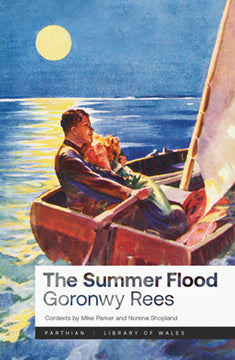The latest title in Parthian’s Library of Wales series
With a foreword by Mike Parker and an afterword by Norena Shopland.
“if he was to love and be loved he must make such open confession of love and receive the assurance of love in return”
Owen Morgan, an Oxford undergraduate, returns to his family home on the rural north coast of Wales for the summer.
The world has changed for Morgan. He is a man coming to terms with himself. University has offered new experiences, desires he had suspected but never acted upon have become real. It was a crime against both the law and God. He asks for forgiveness each time.
A month in the decadence of Weimar Germany has shocked and enthralled him. At home, his cousin Nest waits for him; patient, loving. Matthews will be waiting for him in college; impatient, demanding.
‘Goronwy Rees’s Summer Flood occupies an important place in the vanguard of queer literature.’ – Norena Shopland, author of Forbidden Lives: LGBT Stories from Wales
‘The Summer Flood captures the voice of a 23-year-old Welshman, writing in the early 1930s as he navigates friendships, relationships, and changing family dynamics entering adulthood, lost in the growth between leaving home and returning. His voice is one that still carries through the valleys of time...’ – Imogen Davies, New Welsh Review
'The republication of this novel is very welcome and Goronwy Rees deserves to be known for something more than the spy scandal by which he is usually defined... [he] was a brilliant man with multiple talents.' – Desmond Clifford, Nation. Cymru
‘He is a hero – a flawed one of course, but a true hero all the same... We have so much to thank him for.’ – Mike Parker, author of On the Red Hill
'The novel caused controversy within Goronwy’s family for including thinly disguised relatives in the plot, but why this book is so important is where it sits in queer literary history.' – Norena Shopland essay in Nation. Cymru
Goronwy Rees (1909 – 1979) was a Welsh journalist, academic, and writer. Born in Aberystwyth as the youngest son of four of Reverend Richard Rees and Apphla James, the family moved to Cardiff in 1923, where Rees gained a scholarship to New College, Oxford. As an undergraduate Rees wrote his first novel, The Summer Flood (1932), the first of ten books he would write during his lifetime. Graduating with a First and as an elected Fellow of All Souls, Rees turned to journalism, spending much of the 1930s reporting from Berlin. In these intellectual circles he met Guy Burgess, Elizabeth Bowen, and Rosamond Lehman. He married Margaret Morris in 1940.
On the outbreak of World War Two, Rees was commissioned to the Royal Welch Fusiliers, until 1946 when he returned to the UK to work in the political section at MI6. By 1953, Rees left London for Aberystwyth, becoming principal of the University College of Wales, only to resign in 1957 as suspicions arose around his involvement with Guy Burgess, his friend turned Russian spy. Rees’s literary achievements have often been overshadowed by his entanglements with MI6 and the Soviets, yet his work still deserves to be read as a significant Welsh voice in 20th-century literature.

